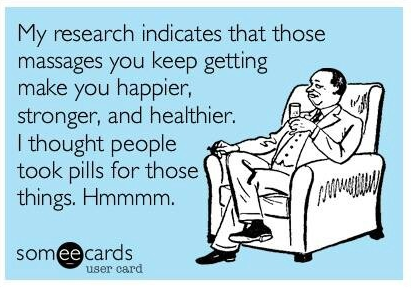
Here’s a staggering statistic – more than 350 million people across our globe suffer from depression. In the United States, it is estimated that one in 10 are depressed.
This is probably not completely surprising if we stop to think about it. Many of us know someone or are related to someone who has depression. And given the odds, many of us may be victim to depression as well.
The good news is that the stigma related to clinical depression is disappearing and more and more people are getting proper treatment.
The extra good news is that there is a lot more empirical evidence proving that massage therapy can play a very positive role in helping people who suffer from depression and anxiety and other problems often associated with being depressed.
The University of Miami’s Touch Research Institute has found a correlation between massage therapy and a body’s heartrate and cortisol levels – two indicators of stress. Cortisol can drive up blood pressure and blood sugar levels and suppress the immune system. Massage also increased serotonin and dopamine, neurotransmitters that help reduce depression.
The research group has discovered changes in stress hormones following massage, sometimes lowering cortisol levels up to 53 percent. Various studies – including with depressed adolescent mothers, gay men with HIV, adult fibromyalgia patients, people with chronic fatigue syndrome and employees of a major public hospital – all reveal the same outcome: less stress.
And although we do not yet know all the ways in which massage therapy accomplishes this stress hormone reduction, the medical community is taking notice too – and that means many of your clients (and many more potential clients) will have extra proof that massage therapy is a bonafide treatment and not just a luxury.
Christopher Moyer, a psychologist who co-edited the book, “Massage Therapy, Integrating Research and Practice,” has stated as much:
“Massage therapists can be confident that massage therapy has been scientifically demonstrated to reduce anxiety and depression, and that the benefits are substantial. Indeed, there are probably no other effects in MT research that have been as consistently demonstrated as these mental health benefits.”
While depression itself is a disease, it can lead to other mental disorders – such as eating disorders – or can be brought on by particular circumstances and events.
Grief from a death or loss or a major injury resulting in loss of a job or a spot on the team can bring on depression with the same debilitating effects.
But thankfully today we know of several alternative therapies in addition to drugs and psychotherapy that can reduce the negative effects of depression – massage therapy, of course, being one of them.
May is Mental Health Awareness Month – a great time to let your clients know that what you do can be a very positive step for many of them suffering from any level of depression and anxiety.





